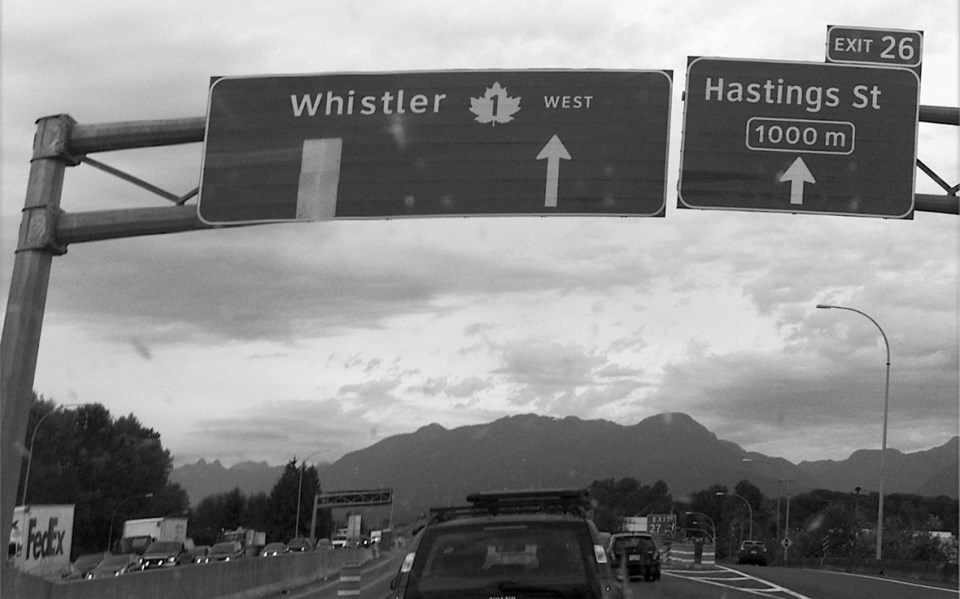If you'd told me back in December 1999, when I took up full-time residence in Whistler, that 20 years would pass in the blink of an eye, I would have laughed. How would such a thing be possible? Metaphysics? Serial alcoholic blackouts?
Believe me, it's possible—and not because of any transmogrification of time or liver tissue. It's just called getting older.
Mind you, by the metric of Whistler's youthful itinerant citizenry I was already "old" upon arrival. Forty-two to be exact; a time of life which, on my hindsight reel, now plays like a second adolescence. In Peter Pan Whistler, 40 really was the new 20. But I digress.
In the mid-1990s, as an editor at Powder and writer for a raft of other global ski and outdoor magazines, I visited Whistler often for professional reasons—whether events, backcountry missions, or to interview high-profile locals or visitors. As a result, having already established friendships and relationships here, when the opportunity to relocate from Toronto presented itself, I jumped.
Settling in, I was less starry-eyed about the place than enthusiastically familiar. Given my numerous previous sojourns, acquaintances frequently mistook my sudden presence for yet another visitation: "How long you here for this time," I was often asked. It felt immensely satisfying to answer "I live here now."
I was here because of the skiing, of course, yet this was the aspect it took me longest to warm up to. On my first trip here in the late '70s, a friend and I skied in the fog for two days, leaving with little idea of the place, but a distinct sense there were discoveries to be made. After several subsequent visits, I had yet to even imagine the fabled Whistler Blackcomb alpine when I finally caught a sunny break in 1996. Not only did I find the views from both mountains outstanding and unique in North America, but so, too, the skiing—the sheer scope and diversity of inbounds terrain, the tree and glacier skiing, the short hikes to massive in-bounds sectors, and the many off-piste gems you could access from these. It left the kind of impression reserved for childhood encounters with the world's most flattering geographic wonders—like a Grand Canyon or Mt. Everest. That seems a fitting memory: after 20 years, I still feel very much like a child every day on the mountain—somewhat giddy with only occasional trepidation.
Once I had the measure of the place I never missed a chance to return, making more friends, exploring further, skiing ever-deeper snow. This crucible was a potent draw, but there was another thing about Whistler that hooked me, and I won't be the first to voice this: the vibe here was different, all about bigger and bolder, with a critical mass of ski bums, pros of every stripe, filmmakers, photographers and other creative types pouring into the place at the same time that both the big-mountain freeskiing, progressive freestyle, and backcountry sledding scenes were exploding—as if the entire snowsport world had plunked itself down in B.C.'s Coast Range. As a seasoned ski writer, I didn't necessarily see Whistler as the centre of the universe so much as a universe unto itself—one I recognized as a place I could live.
On one of those pre-citizen trips, standing atop West Cirque, my eyes fell between my skis and down over the white veins braiding their way into Whistler Village, where I also saw this: beyond the lifts and plazas and cobbled streets and shops and restaurants curled the pavement paisleys wrapping schools and parks. So ... it wasn't just visitors like me or an annual crop of ski-bum pilgrims that made Whistler what it was. People lived and worked and raised kids here. And this alpine playground, so close yet a world away, defined their lives. I could see why people were drawn here—but what kind?
After two decades I know the answer: every kind. The surprising energy of this town lies in its diversity: builders, athletes, artists, musicians, naturalists, chefs, guides, instructors and a multitude of others hailing from every part of Canada and beyond, a nexus of sensibilities that brought a critical mass of relentless innovation. Many who move here from smaller, sleepier mountain towns expecting to be overwhelmed are instead pleasantly surprised: if you want the full-on, ski-town vibe and nightlife, it's here like nowhere else; but if you're looking for peace and solitude, it's also here in abundance.
This contrast of wilderness opportunity and big-city attitude has shaped Whistler—and now myself. In cultivating a life apart from the industry that keeps the town afloat, Whistler's vibrant mix of arts, culture and outdoor enthusiasm has created something more meaningful to share with visitors—character.
Today, I still get lost poking around on the mountain—but not because it's foggy. Even after all this time, I still find something new to ski every time I go out. And this—a constant sense of potential discovery—is why no day in the 20 years that I've been here has ever been less thrilling than the last one.
Leslie Anthony is a Whistler-based author, editor, biologist and bon vivant who has never met a mountain he didn't like.




